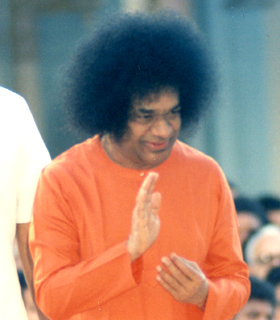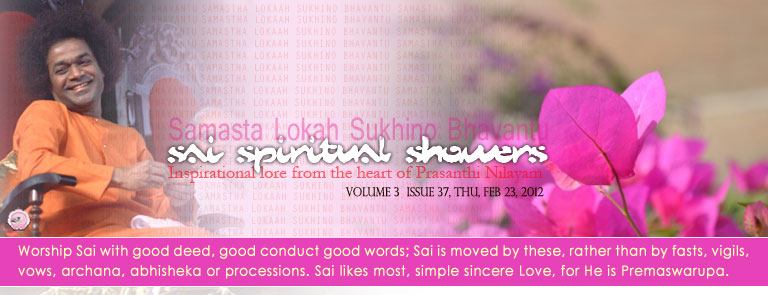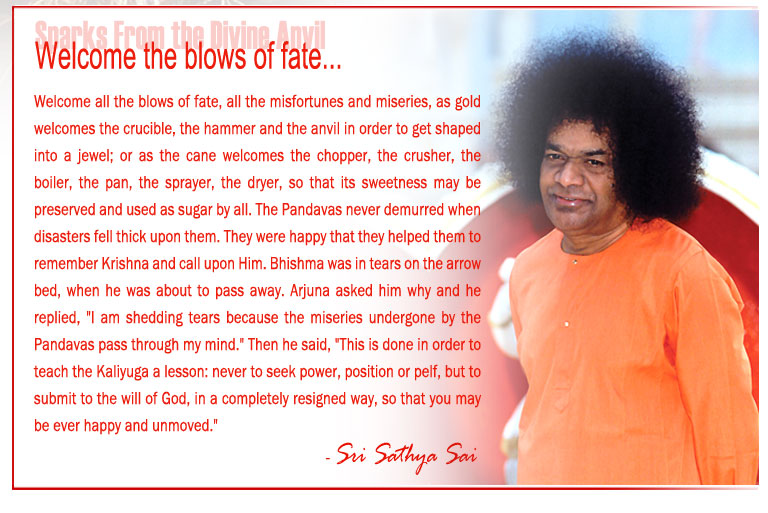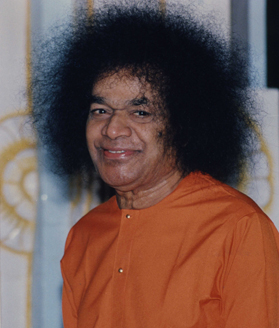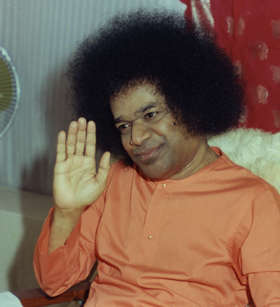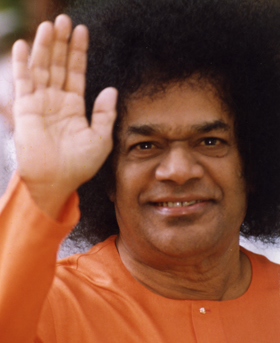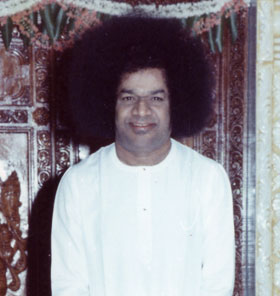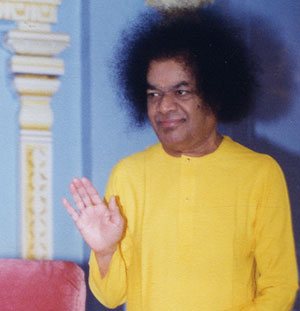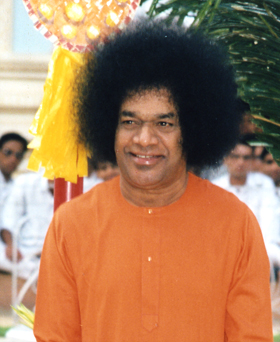renuka
Well-known member
[TABLE="width: 725, align: center"]
[TR]
[TD="bgcolor: #d8dce2, colspan: 2"] [/TD]
[/TR]
[TR]
[TD="colspan: 2"][TABLE="width: 100%"]
[TR]
[TD][TABLE="width: 100%"]
[TR]
[TD]
 [/TD]
[/TD]
[/TR]
[/TABLE]
[/TD]
[/TR]
[TR]
[TD="bgcolor: #9CA9E7"]
[TR]
[TD="bgcolor: #d8dce2, colspan: 2"] [/TD]
[/TR]
[TR]
[TD="colspan: 2"][TABLE="width: 100%"]
[TR]
[TD][TABLE="width: 100%"]
[TR]
[TD]

[/TR]
[/TABLE]
[/TD]
[/TR]
[TR]
[TD="bgcolor: #9CA9E7"]
[TABLE="width: 100%"]
[TR]
[TD="width: 73%, bgcolor: #bdc4e3"][FONT=Arial, Helvetica, sans-serif][SIZE=-1]21 February, 2012[/SIZE]
[TR]
[TD="width: 73%, bgcolor: #bdc4e3"][FONT=Arial, Helvetica, sans-serif][SIZE=-1]21 February, 2012[/SIZE]
[/TD]
[TD="width: 27%, bgcolor: #bdc4e3"]
[/TR]
[/TABLE]
[/TD][TD="width: 27%, bgcolor: #bdc4e3"]
[FONT=Arial, Helvetica, sans-serif][SIZE=-1]Featured on Radio Sai:[/SIZE][/FONT]
[/TD][/TR]
[/TABLE]
[/TR]
[/TABLE]
[TABLE="width: 100%"]
[TR]
[TD="width: 22%, bgcolor: #bdc4e3"][TABLE="width: 100%"]
[TR]
[TD="width: 34%"][FONT=Arial, Helvetica, sans-serif]What is more important, human effort or divine grace? Bhagawan explains and also guides us as to how to earn divine grace.[/FONT][/TD]
[TD="width: 1%, bgcolor: #D4D6DC"] [/TD]
[TD="width: 33%"]
[FONT=Tahoma, Geneva, sans-serif][SIZE=-1]Audio Special:
"Medical Marvels of Love,
Part- 26 - Ravinder from Betul[/SIZE]
"Medical Marvels of Love,
Part- 26 - Ravinder from Betul[/SIZE]
[FONT=Tahoma, Geneva, sans-serif][SIZE=-1]"[/SIZE][/FONT][FONT=Arial, Helvetica, sans-serif][SIZE=+1]
Click Here to Listen Now[/SIZE][/FONT][/FONT]
Click Here to Listen Now[/SIZE][/FONT][/FONT]
[/TD][TD="width: 1%, bgcolor: #D4D6DC"] [/TD]
[TD="width: 29%"]
[FONT=Tahoma, Geneva, sans-serif][SIZE=-1]H2H Special:
"Special Discourse Quiz
on Lingodbhavam"[/SIZE]
"Special Discourse Quiz
on Lingodbhavam"[/SIZE]
[/TD][TD="width: 2%"]
[/TD][/TR]
[/TABLE]
[/TD]
[/TR]
[/TABLE]
[TABLE="width: 100%"]
[TR]
[/TR]
[/TABLE]
[/TD]
[/TR]
[TR]
[TD="bgcolor: #FFCCCC, colspan: 2"]
[TABLE="width: 100%"]
[TR]
[TD]
[/TR]
[/TABLE]
[/TD][TR]
[TD]
[FONT=Arial, Helvetica, sans-serif][SIZE=+1]Watch the Live Video Webcast of the conclusion of Akhanda Bhajans today at 5:00 a.m. and the Dance Programme by students at 5:00 p.m. (IST), on our website www.radiosai.org[/SIZE][/FONT]
[/TD][/TR]
[/TABLE]
[/TR]
[TR]
[TD="width: 36%, bgcolor: #e3e3eb"]
[TABLE="width: 99%"]
[TR]
[TD]
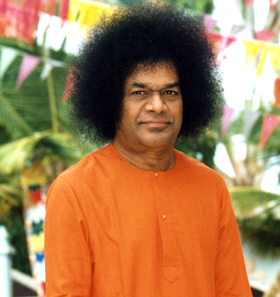 [/TD]
[/TD]
[/TR]
[/TABLE]
[TR]
[TD]

[/TR]
[/TABLE]
[TD="width: 64%, bgcolor: #e3e3eb"]
[TABLE="width: 99%"]
[TR]
[TD][FONT=Arial, Helvetica, sans-serif]By the time it rains, if seeds have not been sown, will there be any crop in the field? If seeds are sown but there is no rain, will any cultivation happen? Both rain and seeds are needed for the harvest to be reaped. Likewise, Divine Grace will bear fruit only when there is human effort too. When there are good thoughts in the mind, they will be reflected as noble actions; on the other hand if the thoughts are ill-disposed, the fruits thereof will be equally bad. Different devotees are bound to differ in their ways of worshipping God. But whatever the method of worship, there must be one-pointed devotion. Love towards God is devotion. Love towards the world is attachment. Develop love for God.[/FONT]
[/TR]
[/TABLE]
[/TD][TR]
[TD][FONT=Arial, Helvetica, sans-serif]By the time it rains, if seeds have not been sown, will there be any crop in the field? If seeds are sown but there is no rain, will any cultivation happen? Both rain and seeds are needed for the harvest to be reaped. Likewise, Divine Grace will bear fruit only when there is human effort too. When there are good thoughts in the mind, they will be reflected as noble actions; on the other hand if the thoughts are ill-disposed, the fruits thereof will be equally bad. Different devotees are bound to differ in their ways of worshipping God. But whatever the method of worship, there must be one-pointed devotion. Love towards God is devotion. Love towards the world is attachment. Develop love for God.[/FONT]
[FONT=Arial, Helvetica, sans-serif][SIZE=-1]- Divine Discourse, Mar 2, 1992.[/SIZE]
[/FONT]
[/TD][/TR]
[/TABLE]
[/TR]
[TR]
[TD="bgcolor: #5c85eb, colspan: 2"]
[FONT=Arial, Helvetica, sans-serif][SIZE=+1]The best way to love God is to love all, serve all. - Baba[/SIZE][/FONT]
[/TD][/TR]
[TR]
[TD="bgcolor: #F7F7F7, colspan: 2"]
[TABLE="width: 100%"]
[TR]
[TD="width: 12%, bgcolor: #EEEEEE"][/TD]
[TD="width: 17%, bgcolor: #EEEEEE"][/TD]
[TD="width: 18%, bgcolor: #EEEEEE"][/TD]
[TD="width: 18%, bgcolor: #EEEEEE"][/TD]
[TD="width: 19%, bgcolor: #EEEEEE"][/TD]
[TD="width: 16%, bgcolor: #EEEEEE"]
[/TR]
[/TABLE]
[/TD][TR]
[TD="width: 12%, bgcolor: #EEEEEE"][/TD]
[TD="width: 17%, bgcolor: #EEEEEE"][/TD]
[TD="width: 18%, bgcolor: #EEEEEE"][/TD]
[TD="width: 18%, bgcolor: #EEEEEE"][/TD]
[TD="width: 19%, bgcolor: #EEEEEE"][/TD]
[TD="width: 16%, bgcolor: #EEEEEE"]
[FONT=Arial, Helvetica, sans-serif][SIZE=-1]Subscribe[/SIZE][/FONT]
[/TD][/TR]
[/TABLE]
[/TR]
[/TABLE]




